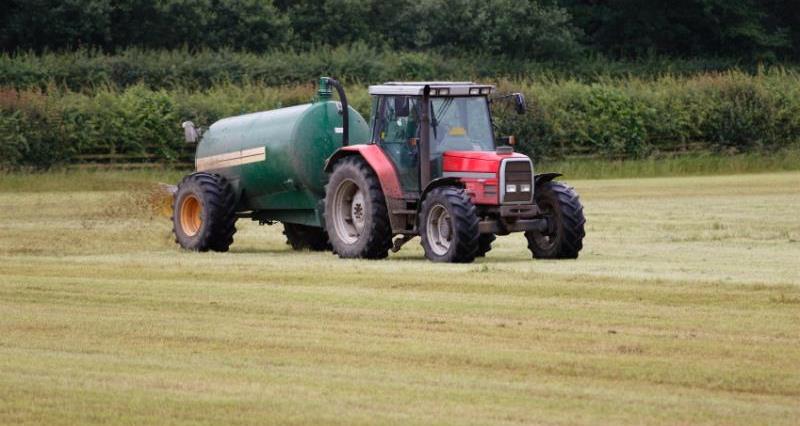The proposals and potential implications for dairy and livestock farmers under the Clean Air Strategy and more recently, the interpretation of Farming Rules for Water (FRfW), have been hitting the headlines, namely due to the restrictions they may impose on livestock slurry and manure applications this autumn.
While these rules are often discussed with regards to arable crops, livestock and dairy farmers are becoming increasingly anxious about the implications for manure storage capacity this winter.
Livestock

Richard Findlay, NFU livestock board chair, pictured above, writes:
Livestock manures are a hugely valuable resource that maintain and improve soil health and productivity. I am continually striving to be even more sustainable on my farm, so I know that by reducing my reliance on purchased fertilisers I will reduce my carbon footprint. Therefore, it seems ludicrous that the Environment Agency, although well intentioned are looking to restrict how we apply and use one of our most valuable resources. I know as land managers we have a responsibility to protect our watercourses from pollution, but these rules are at odds with many other government policies and our own ambition of becoming net zero by 2040.
We need policies that help us transition towards a greener farming future, but I see these rules threatening vital muck for straw collaborations between livestock and arable farmers that are so important for improving soil health and reducing artificial fertiliser use.
But it doesn’t stop there. Environmental permitting regulations introduced in the pig and poultry sectors to help limit ammonia emissions look set to be extended to cover the dairy and beef sectors. It is likely that the UK will miss its ammonia emission target which could result in a legal challenge for government.
Livestock and dairy farmers of all sizes will need to consider how they manage and reduce emissions on their farms. This has to be done in a cost effective and resource efficient way, making the best use of the valuable asset we have to feed our soils and crops. Identifying where your emissions come from will be key to this. By adopting and implementing new techniques such as low emission slurry spreading, incorporating manures within 12 hours of spreading and ensuring protein in livestock diets match nutritional needs, the livestock and dairy sectors can make reductions in order to stave off the increased cost and burden which further regulation or environmental permitting would bring.
At the recent joint livestock and dairy board, we were joined by Defra Deputy Director, Bill Parish, to discuss Defra’s approach and how they are considering taking this forward. Dairy board chair Michael Oakes and I remain absolutely committed to finding a solution that is practical for the industry but makes meaningful progress towards our collective air, water and climate goals.
The NFU has produced some excellent guidance which you can read at NFUonline: Farming Rules for Water: Read our latest guidance
Dairy

NFU dairy board chair Michael Oakes, pictured above, writes:
Livestock manure and slurry management aligned with best practice, represents a safe, highly effective, and environmentally valuable alternative to artificial fertiliser. Responsible storage, assessment of soil and crop need, and awareness of the weather conditions all represent simple common-sense elements of best practice. As livestock and dairy boards, we believe it’s vital that any changes to legislation are based on science and evidence, and properly consider ammonia and other GHG emissions in the round. Not only this, we are keen to see future regulation not developed in a siloed approach. We know that there are interactions and consequences between all inputs, outputs and actions on farm.
For example, if Farming Rules for Water mean more spreading of manures in the summer months, when the weather is warmer, that could have a negative impact on ammonia emissions, and from what we have seen so far, we are not sure that Defra or the Environment Agency are thinking this through. Therefore, it’s crucial that government take a holistic approach when considering legislation, and carefully considers the potential effects and costs to agriculture and indeed the environment – no one would like to see the cost of increased regulatory burdens legislating good farms out of business, nor would we want to see legislation which does not enable positive gains for the environment. We continue to reiterate these points through our Defra and Environment Agency industry meetings while providing practical and technical feedback on reports and ongoing discussions.
Proposals like the Slurry Investment Scheme could offer tangible benefits that would encourage farmers to invest in new manure storage and spreading equipment and the recently published AHDB and SRUC research into feed efficiency AHDB into feed efficiency must become part of the agenda, as the fewer kilos of feed an animal requires to reach its target weight the lower its ammonia and methane emissions will be.
The British livestock and dairy sectors are striving to improve our productivity and that all means greater adoption of best-practice techniques and technologies. Through initiatives such as the Dairy Roadmap and development of a similar roadmap for beef will set and agree ambitious targets for the environment, efficiency and overall sustainability which will continue to drive the industry forwards. We just need the support and backing of government to enable the necessary progress without burdensome legislation.
